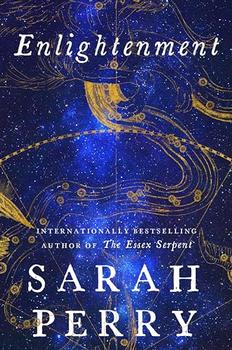Summary | Excerpt | Reading Guide | Reviews | Beyond the Book | Readalikes | Genres & Themes | Author Bio

A Novel
by Sarah Perry
The evening was coming doggedly in. Wind seeped over the concrete windowsill, and a bewildered pigeon struck the glass and slipped from view.
"You're our longest-serving contributor," said Carleton, flinching at the bang. "Our most admired. Indeed I should say our most popular." I'm beginning to speak like him, he thought: Thomas Hart is catching, that's the trouble. "I've often heard it said that it's a consolation—that's the general feeling, as I said to the board—to wake on Thursday morning, and find your thoughts on Essex ghosts and literature and so on, before turning to the matters of the day."
"Literature," said Thomas mildly to the planisphere, "is the matter of the day."
"Your work has an old-fashioned feel," Carleton pressed on. "You'll allow me that. I argue that's your charm. Other papers might seek out some young person to be the voice of their generation, but here at the Essex Chronicle we pride ourselves on our loyalty."
"I could hardly have asked to be the voice of a generation," said Thomas, "since there is only one of me."
Briefly Carleton considered the other man, of whom he'd made such a study he might have been appointed professor of Thomas Studies at the University of Essex. He knew, for example, that Thomas was a confirmed bachelor, as they say, never seen in the company of a beautiful young person or a stately older one; that he had about him the melancholy religious air of a defrocked priest, and was known to attend a peculiar little chapel on the outskirts of town. He had a courtly manner considered an affectation by those who didn't like him, and irresistible by those who did; and if it couldn't be fairly said that he was strange, there was certainly the impression of his being the lone representative of his species. Of Thomas Hart's family, companions, politics, tastes in music, and weekend pursuits, Carleton knew nothing, wondered often, and would never ask. That Thomas had worked for the Chronicle since 1976 was easily established, as was the fact that he'd published three brief novels since that date. Out of a sense of delicacy Carleton never mentioned that he owned all three of these, and found them elegant and elliptical, couched in prose that had the cadence of the King James Bible, and concerned with deep feeling suppressed until the final pages (when some confusing event ensued, generally in bad weather). Were Carleton his literary agent, he might have pleaded with the other man to allow himself, in fiction at any rate, to say what he really felt, and not veil it all in atmosphere and metaphor; but he confined himself to glancing sometimes at the cheap green notebooks that attended Thomas like spoor and were now stacked three deep on his desk (Monday, he read surreptitiously, late winter. Bad weather—). It hadn't occurred to him that Thomas wouldn't know a planisphere when he had his hands on it, or that a tentative suggestion he look to the stars would be so unwelcome. Blinking, he recalibrated his idea of Thomas Hart, and became persuasive: "Loyalty," he said, "is a key concern of ours. But it is increasingly felt that you might benefit from new material, and it struck me you might like to write about astronomy. You see"—he reached for the planisphere, and moved it—"this is today's date, and so you'll find Orion in the south."
"Astronomy," said Thomas, with the look of a man tasting a bitter substance. He turned the disk. He extinguished the stars.
"In fact," said the editor, "it struck me that you could write about this new comet." He made a withdrawal from the store of knowledge inherited from his father: "It's a Great Comet, you know, with naked-eye visibility. People really go in for that sort of thing. Bird's Custard once put a comet on their adverts. Perhaps it's a bad omen, and there'll be a disaster, then we'll have something for our front page" (he brightened here at visions of catastrophic fires).
Excerpted from Enlightenment by Sarah Perry. Copyright © 2024 by Sarah Perry. Excerpted by permission of Mariner Books. All rights reserved. No part of this excerpt may be reproduced or reprinted without permission in writing from the publisher.




There is no science without fancy and no art without fact
Click Here to find out who said this, as well as discovering other famous literary quotes!
Your guide toexceptional books
BookBrowse seeks out and recommends the best in contemporary fiction and nonfiction—books that not only engage and entertain but also deepen our understanding of ourselves and the world around us.